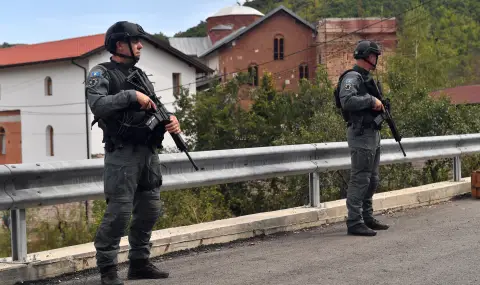Weeks after an explosion at a strategic canal in Kosovo, the authorities of the unstable country are under increasing pressure from Serbian opponents who accuse them of politicizing the issue ahead of February elections, writes BTA, citing AFP.
The explosion in late November ruptured a canal providing water to hundreds of thousands of people and the cooling systems of two coal-fired power plants that generate most of Kosovo's energy. Kosovo Prime Minister Albin Kurti blamed arch-rival Serbia for what he called a "terrorist attack," but many in his administration have since remained largely silent on the affair.
The Serbian government has denied any links to the explosion and announced plans to conduct its own investigation.
After the initial outburst of accusations, Kosovo authorities have offered scant evidence, with many toning down their rhetoric in recent days.
"What have we learned from the investigation into the attack on the Ibar-Lepenac canal? Unfortunately, we have learned nothing so far," said Aleksandar Arsenijevic of the Serbian Democracy party, based in Kosovo's restive northern region. "Everything is being kept under wraps, and the investigation is clearly being dragged out to be used for political purposes." There is a serious risk that the Ibar-Lepenac case will be overshadowed by other events“.
Serbia and Kosovo have been at odds since the end of the war in the late 1990s between Belgrade forces and ethnic Albanian separatists in Kosovo, then a province of Serbia. Belgrade has never recognized Kosovo's 2008 declaration of independence.
The explosion at the canal occurred near the border with Serbia - an area home to many of Kosovo's remaining ethnic Serbs and which has long been a hotbed of unrest.
Kurti accused Serbia of taking a page out of the “game“ Russia in Ukraine, trying to cut off electricity and heating in Kosovo during the cold winter months.
After arresting 10 suspects days after the blast, however, Kosovo police released all but two of them due to lack of evidence, according to one of their lawyers.
Nebojsa Vlajic, who represents one of the suspects still in custody, said police found a hunting rifle and some ammunition during a search of his client's home. But authorities did not find "any explosives or explosive devices, such as dynamite, detonators, caps, fuses," he told AFP.
“What they found could not explode. "Your TV or water heater is more likely to explode than anything found in it," he said.
The explosion came just months before Kosovo's parliamentary elections, with some seeing the race as a referendum on Kurti's hardline policies aimed at Serbia and its ethnic Serb allies in Kosovo.
On Tuesday, Serbian President Aleksandar Vucic accused Kurti of using the explosion to justify an upcoming crackdown on Kosovo Serbs and their parties ahead of the elections.
"Our people are engaged in a difficult battle for survival and political legitimacy," Vucic told a legislative session. "Kurti's regime will accuse Serbs without any material evidence of sabotaging the Ibar-Lepenac canal with a clear political motive."
Since taking office in 2021, Kurti has spent years dismantling a parallel system supported by Belgrade to provide social and political services to Kosovo Serbs.
He has banned the Serbian currency and Serbian car registration plates and closed Serbian post offices and banks in Kosovo.
His policies have caused an uproar in Serbia while also angering Kosovo's closest diplomatic partners in the United States and Europe, who have accused Kurti of undermining fragile ethnic relations in the region.
The Kosovo government did not respond to questions from AFP about the ongoing investigation into the blast.
Analysts said the failure to provide more evidence or capture the perpetrators of the attack was likely to add another layer of uncertainty ahead of Kosovo's elections scheduled for February 9.
“The impact of this event is undeniable,“ said the political commentator Shpatim Gashi. “This will shape the political debate“.
Former Kosovo intelligence officer Burim Ramadani told Agence France-Presse that any new information about the incident would likely “remain in the shadows“ for fear it could spark new unrest.
“The security situation in this part of Kosovo is fragile,“ he said.
